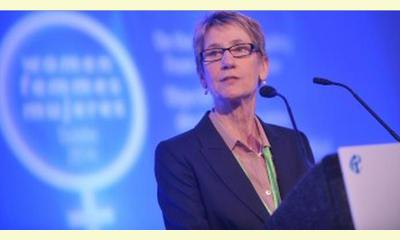|
|
Dublin: Women central to sustainable future development
un article par Education International (abridged)
The future will be created in classrooms. This was the key message of Her Excellency Tarja Halonen in her keynote opening speech to the EI’s Second World Women’s Conference today, 7 April, in Dublin, Ireland. Addressing almost 400 delegates from education trade unions representing around 90 countries across the globe, the former President of Finland said that teachers and educators play a central role in shaping the values of the next generation.

EI President Susan Hopgood
click on photo to enlarge
The conference, with the theme, ‘Women in Trade Unions and in Education: From Words to Action’, was also addressed by Ireland’s Education and Skills Minister, Ruairi Quinn TD, and EI President Susan Hopgood. Setting the tone for the three-day event, Hopgood said; ‘Our roles as educators and trade unionists and women make us indispensable to decision making about education policies and priorities. But we are also a powerful force for advocacy and change across a range of issues.’
In her speech on women and power in the post-2015 world, Halonen, who began her career as a trade union lawyer, highlighted the value of peer support. “It is really important than women support, encourage, and motivate each other as well as benchmark and learn from each other,” she said, adding that Finland’s strong education system owes much to its strong union, OAJ, an affiliate of EI. . .
Halonen also highlighted the role of women in sustainable development, the importance of sexual rights and appropriate sexual education, the security of boys and girls in schools, and the role of civil society.
Ruairi Quinn, TD, Minister for Education and Skills in Ireland, highlighted how a quota system is being used in that country to ensure a minimum number of female participants in politics and State boards. He placed this in an educational context where 85 per cent of teachers at primary school level are women, but occupy just over half of leadership positions at this level. Women constitute almost 43 per cent of academic staff at third level in Ireland but represent only 19 per cent at professorial level. “We cannot be complacent,” he said, adding that Ireland needs gender-specific research and policies. . .
In the first plenary panel on Women and Leadership in Trade Unions, the participants, all women general secretaries of their unions, acknowledged the support of family as well as female and male colleagues and mentors in their rise through their unions’ ranks.
Hosted by Haldis Holst, EI Deputy General Secretary, the panel comprised Christine Blower of the National Union of Teachers in the UK, Habiba Mizouni of Tunisia’s National Union of University College Doctors, Pharmacists and Dentists, and Sheila Nunan of the Irish National Teachers’ Organisation. Amongst other issues, it explored whether quotas or women’s committees were useful tools to boost the representation of women in top union positions. . .
[Thank you to Janet Hudgins, the CPNN reporter for this article.]
(Click here for a Spanish version of this article or here for a French version.)
|








|
DISCUSSION
Question(s) liée(s) à cet article:
Do women have a special role to play in sustainable development?,
* * * * *
Commentaire le plus récent:
This discussion question applies to the following articles:
Dublin: Women central to sustainable future development
Calling women: Why women and technology are a perfect pairing
Indigenous women from Canada and the Global South unite at the UN Permanent Forum on Indigenous Rights
Mothers Light Up Homes in Rural Tanzania
Bali summit: Are women our best hope for fighting climate change?
U.N. Climate Talks Advance Link Between Gender and Climate Change
Women Revolutionise Waste Management on Nicaraguan Island
On remote Philippine island, female forest rangers are a force to be reckoned with

|
|









